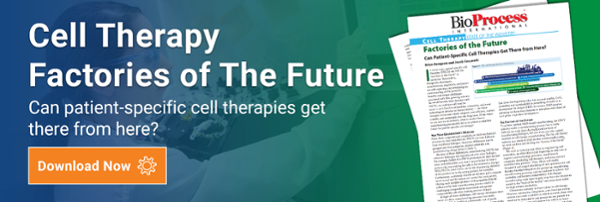CAR-T cell therapy presents numerous challenges for cell therapy developers who are looking to move towards commercialization. The move from development to commercial scale manufacturing of a patient-specific cell therapy is not a straightforward task.
Understanding these challenges is a key part of being able to deal with them and move your CAR-T cell therapy manufacturing process towards commercialization. Some of these challenges are:
Inability to Achieve Sustainability by Increasing Production Scale for Patient-Specific Therapies
The addition of chimeric antigen receptors to a patient’s T-cells is a delicate process that has to be done on a per-patient basis. In the clinic, it can be a difficult task to collect enough T-cells from a patient’s blood because apheresis is typically scheduled when the patient is not experiencing severe symptoms—the further along the case, the fewer opportunities there will be for collection.
It is also difficult to isolate the T-cells that need to be modified from a blood sample that is full of cancer cells, as noted in the “Adoptive Cell Therapies” article by Dr. Cenk Sumen et. al in the Spring 2015 issue of Drug Discovery World.
Because of these difficulties, and the patient-specific nature of the therapy, it is not possible to simply scale up the production of therapy products to offset costs. The entire journey of the cells from initial collection to delivery of the modified cells needs to be considered.
To achieve sustainable commercial-scale manufacturing of CAR-T cell therapies, cell therapy manufacturers/developers need to find ways to eliminate inefficiencies in their manufacturing process to make their product more sustainable over time. This may involve using a combination of automation, quality controls, multi-channel supplies, and strategies for addressing peaks and valleys in CAR-T cell therapy demand.
Maintaining Process Sterility
Another issue is that because CAR-T cell processes modify living cells, sterilization of the final product is not an option. Anything that would destroy or sterilize bacteria could also damage the treatment cells. Instead, aseptic processing is required throughout the entire manufacturing process—from initial collection, to modification, to delivery—to maintain sterility assurance.
If contamination occurs, it could put the patient’s life at risk.
Some tools that can help with maintaining process sterility include:
- Automation—using manufacturing robots to remove the single biggest contamination risk in any clean lab setting (the human element).
- Quality and safety testing tools—evaluating what testing methods used to assess the safety of cell therapy products to find a solution that reliably identifies risk in time to avoid issues.
- Sealed Grade A or Class 100 environments—hermetically-sealed enclosures are a basic part of ensuring cell therapy sterility.
Integrating automation and closed systems pose yet another challenge. Currently, there are several innovative products on the market, such as Miltenyi Biotec’s CliniMACS Prodigy® system and the Lovo cell processing system from Fresenius Kabi, that could help move cell processing to the next level of automation.
The CliniMACS Prodigy® system offers an all-in-one solution for cell processing in a closed good manufacturing practice (GMP) compliant system, while the Lovo cell processing system automates the labor-intensive tasks of separation, washing, platelet-depletion, fluid-exchange, and concentration of living cells. As cell therapy continues to advance, more of these innovative systems will be necessary. To that end, PCT has been directly engaged in developing technology
to address this need.
Achieving Quality Targets
Cell therapy developers require high-quality raw materials as well as robust clinical manufacturing processes to achieve the strict requirements of CGMP. A Quality Target Product Profile (QTPP) helps cell therapy developers detail the intended post-manufacturing attributes of the product that are required to support safety and efficacy.
Some common elements of a QTPP include:
- Characteristics profile (e.g. description, formulation, dosage, potency, volume, shelf life);
- Safety profile (e.g. microbial assurance, cellular impurities, manufacturing residuals);
- Use profile (e.g. indications for use, treatment timing, preparation and use); and
- Business profile (e.g. geographies, market projections, clinical/commercial milestones, cost of goods targets, IP).
Determining Cell Therapy Dosages
Part of the reason why meeting these quality profiles is so important is that a deficiency in quality can lead to safety issues for the patient. As noted by Jessica Hartmann et. al. in their EMBO Molecular Medicine article:
"CAR T cells are complex medicinal products with the unique feature of being able to self-amplify and persist in treated patients... While CAR T cell therapy has shown impressive clinical benefit, it is sometimes associated with a variety of toxicities... eight trials having a suicide gene or suicide switch integrated have been initiated."
The self-replicating nature of the live cells complicates the process of determining the dosage. If the cells replicate too quickly, they may cause issues. On the other hand, if the cells fail to replicate, then the treatment will not achieve the desired effect. Some developers are conducting research into programming their cell therapy products with a built-in "suicide switch" to kill or render the cells sterile once the therapy is finished—helping to prevent toxicity issues from accidental over-dosing.
Conclusion
Innovation always presents challenges, and CAR-T cell therapy manufacturing is no exception. There are economic, logistical and manufacturing constraints, as well as safety concerns given that these are living drugs with cells that proliferate and remain in the body long after the first treatment.
When it comes to T-cells, moving from academic-stage to commercial-ready manufacturing processes that are truly deliverable means that high-quality products must be consistently produced at a reasonable cost of goods to meet demand over the commercial life of the product. However, by balancing T-cell therapy manufacturing with cutting-edge innovation in bioprocess engineering, we can help deliver unique solutions that will accelerate the clinical process development of T-cell programs.
For more information, please download the article “Factories of the Future: Can Patient-Specific Cell Therapies Get There from Here?” at the link below:
